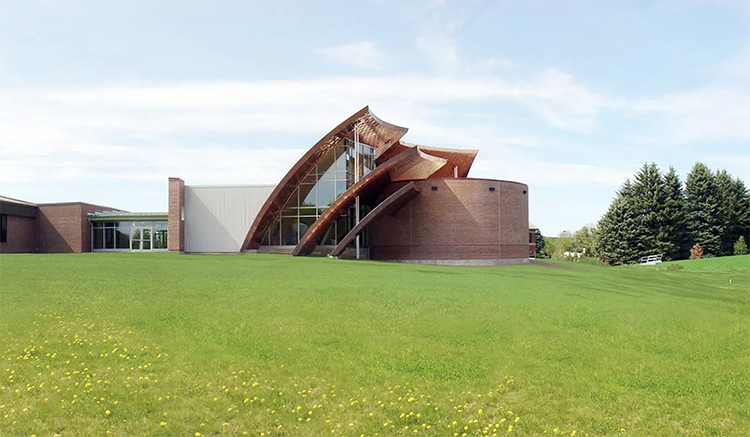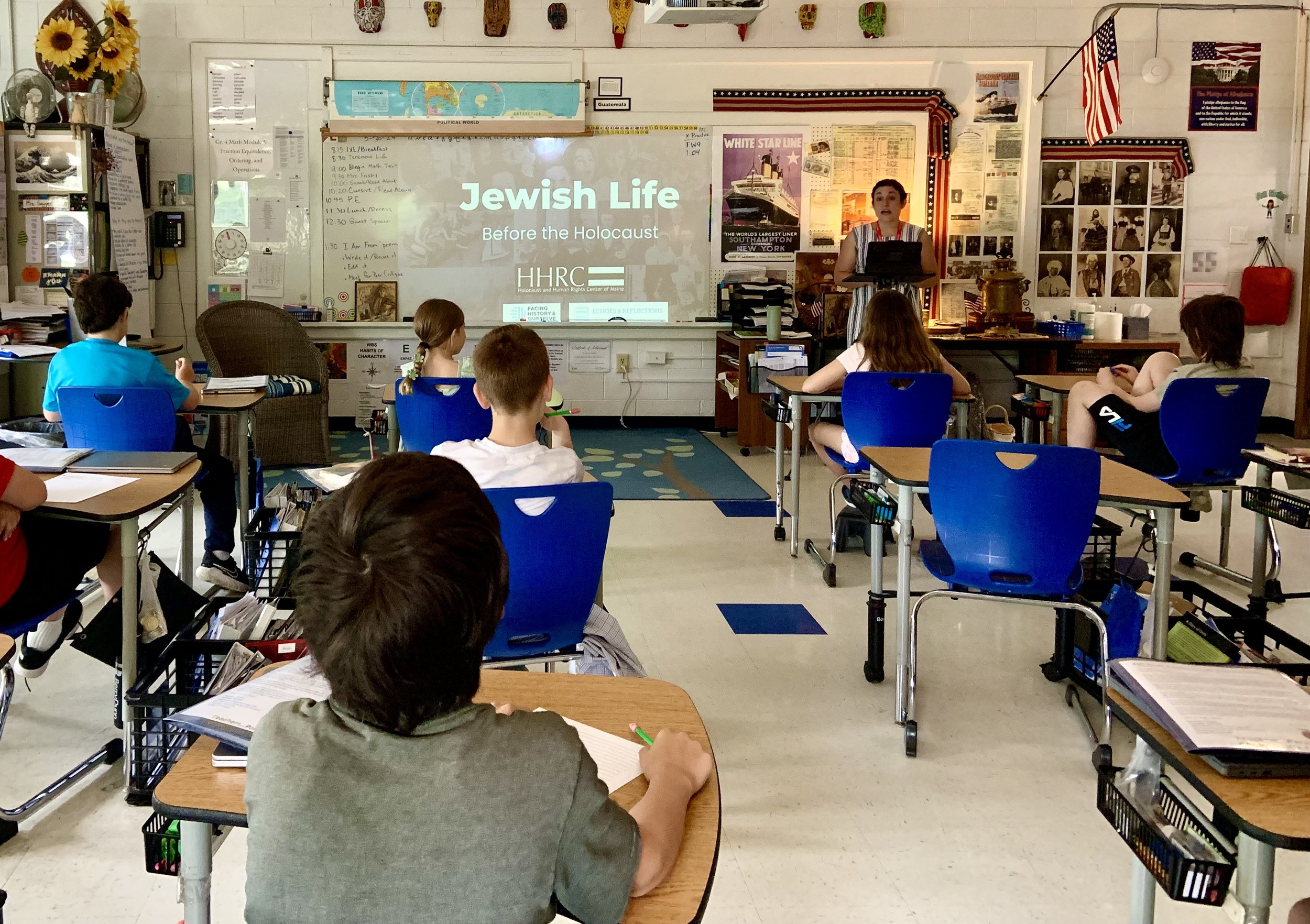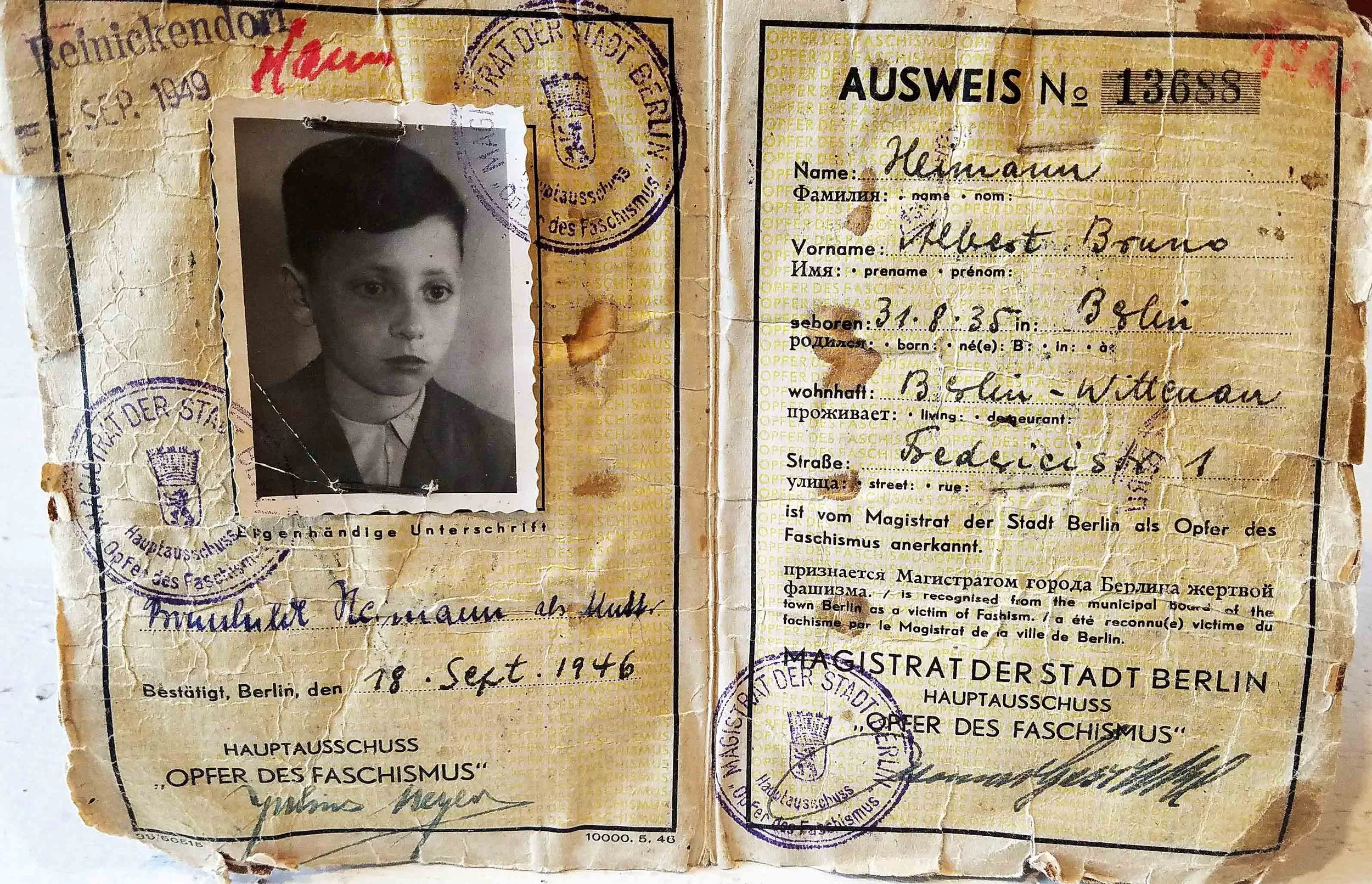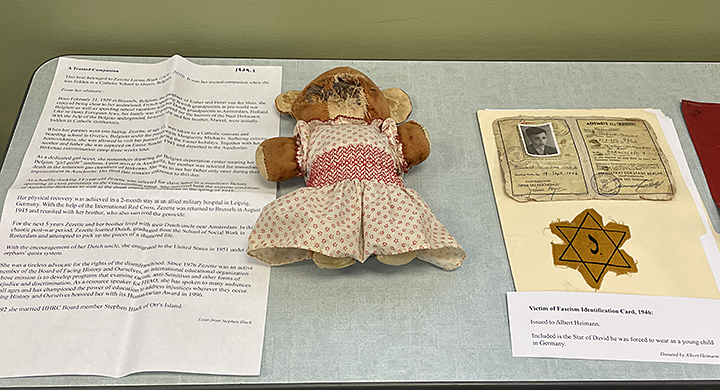A new program: Black Mainers: A History of Resistance and Resilience
We are excited to announce that our newest educational program, Black Mainers: A History of Resistance and Resilience, is complete and ready to bring into schools. The research, writing, slideshow creation, and piloting has taken almost a year—time well spent, and we are creating a lesson-plan booklet for teachers to use after our visit. This program looks at the period leading up to World War I. It is not meant to give a comprehensive history of the black experience in Maine but rather a complement and supplement the work that teachers are already doing in their classrooms. The primary ideas that we hope students take away from this program center around black Mainers persistence, resilience, and resistance to oppression by demonstrating that African Americans have actively resisted racism and inequity in their lives and throughout Maine’s history. This program does this by focusing on individuals and their stories.
Every Gift Counts: Please Support Our Important Work
Your generous contribution supports our work: building brave and welcoming communities by promoting universal respect for human rights through education, outreach and cultural experiences. This ambitious goal takes many forms. We offer sixteen educational programs to Maine students, sponsor talks and performances, curate exhibits, house valuable archives, showcase multi-media stories from survivors, and invite all visitors into the beautiful Michael Klahr Center.
Were The House Still Standing
To preserve the oral testimonies of Holocaust survivors and liberators living in Maine, In 2005 the HHRC commissioned Sculptor Robert Katz to create an 80-minute multimedia installation, a centerpiece of the Michael Klahr Center, entitled Were the House Still Standing. For 18 years visitors have been moved by the stories of personal trauma, tragedy, bravery and resilience told by the survivors, many founders of the HHRC. Now it needs a significant upgrade. We need donations and grants to fulfill this goal. Can you help us?. Please donate here.
Student Awards & Scholarships
We are delighted to announce the opening of the 2024-25 Awards & Scholarship Program sponsored by the HHRC. Below are descriptions of the opportunities with links to the applications on our website. We would appreciate it if you could help us spread the word about this important tradition: If you know a student who is interested, please let them know. This is an integral piece of our education offerings and a meaningful way to honor the mission and vision of those who created the HHRC 39 years ago. The awards ask students to think deeply about their personal experiences relating to the Holocaust and human rights, encouraging self reflection and commitment to the values we uphold and teach. The deadline to submit is December 1, 2024.
The Lawrence Alan Spiegel Remembrance Scholarship
The Spiegel Scholarship ($1,000) is awarded annually to the high school senior who authors the prize-winning, original essay on the prompt: “Learning about the Holocaust affected my view of the world and it is important for others to learn about it too.” Criteria: originality of voice and viewpoint, structure, command of language and mechanics. The photo is of Brooke Chase, the 2023 Spiegel Award Recipient. Click here for an application.
The Mathilde Schlossberger Outstanding Student of the Year Award
The Schlossberger Award recognizes an exceptional piece of original writing, fiction or non-fiction, or an unusually expressive piece of visual or performance art relating to human rights. The award was created by Florence and Kurt Strauss of Portland in memory of Kurt’s maternal grandmother, who was murdered at Theresienstadt. Click here for an application.
Khmer Sisters Exhibit
These arresting exhibits of sculpture and photography by Chanthu and Mardi Millay are worth a trip to the Michael Klahr Center. The first is Child of War series by painter and sculptor Chanthu Millay. Her use of metal and ceramic sculpture and paintings depict the emotions she experienced as her family’s lone survivor of the Khmer Rouge regime in Cambodia. Many contain images of war and disruption, while others touch on selfhood, freedom, abstraction. On her website she writes, "Not only can art connect us to our various identities, heritages, and cultures, but it enriches our respect and appreciation for the world around us." In her debut photographic exhibition Rethinking Place, Mardi Millay traveled to her birth culture and country of Cambodia and neighboring Southeast Asian countries. She engages with her subjects to reflect and capture a sense of home—be it a physical place, feeling or chosen community. Using this expanded definition of place, she explores identity through her adoptive family and relationships with an underexposed perspective. Her portraits ask the viewer to wonder about a child, woman, elder's life—and the stories behind the scenes and expressions.
These two exhibitions are in collaboration with Khmer Maine, and our friend and former HHRC colleague, Marpheen Chann. They opened on May 20th in recognition of Cambodia National Day of Remembrance, to commemorate the victims of the genocide in Cambodia that took place between 1975 and 1979
Summer Seminars for Educators
Our two annual Summer Seminars finished up last Thursday. In all 29 educators spent two summer days becoming more prepared and knowledgeable for the coming school year. The first seminar focused on how to teach the Holocaust in ways that resonate with different age groups through literature, conversation, and helpful activities. These are difficult subjects; it's important to help children and young adults be supported and thoughtful, with time to feel and reflect as they are introduced to scary events and dark aspects of human nature. The second seminar delved into strategies for creating a safe and welcoming classroom where no one feels left out or diminished. With the help of HHRC staff and several professionals in the field, participants befitted from presentations, fresh ideas, ample resources, and educational games that help create supportive, productive, and enjoyable learning communities. See photos here.
Lois G. Reckitt is our 2024 Gerda Haas Award Recipient
Lois Galgay Reckitt is the 2024 recipient of the Gerda Haas Award for Excellence in Human Rights Education and Leadership. Lois was known as a powerful activist for women, working on behalf of oppressed, vulnerable and marginalized people throughout her adult life—indeed right up until her death. Lois was committed to making sure that all people were treated with respect and dignity. From 1984 to 1987, Lois served as executive vice president of the National Organization for Women in Washington, D.C. and then as deputy director of the Human Rights Campaign Fund, a political action committee that she had co-founded in 1980. Back in Maine, Lois became co-founder of the Human Rights Campaign Fund, the Maine Coalition for Human Rights, the Maine Women’s Lobby, and the first Maine chapter of the National Organization for Women. She established the Family Crisis Shelter in Portland and successfully lobbied to protect victims of domestic abuse, leading to the passage of several bills. She served in the Maine House of Representatives from 2016 until her death in 2023 where she fought to pass the Equal Rights Amendment in the Maine Constitution. Lois was inducted into the Maine Women’s Hall of Fame in 1998.
The Archive Project
The HHRC has a longstanding and rich collection of artifacts related to the Holocaust and civil rights. Last year we began to archive these valuable objects, assigning each one a number and category, storing them in professional archive containers, and using protective display cases in the Michael Klahr Center for our visitors to enjoy without fear of causing damage to the artifacts. The next step, for which we received funding from the Sam L. Cohen Foundation, involves two separate and yet connected projects. The first is a workshop for teachers to familiarize themselves with the Holocaust artifacts that we have at the HHRC and how to use them (digitally) in their classrooms. The second involves creating individual programs that center on specific objects. So far we have written three: one is based around a child’s shoe found at one of the camps; one focuses on currency from the Lodz ghetto; and the third explores letters from a Berlin doctor Hans Muehsam written to his cousin in New York as he desperately sought help obtaining a visa to leave Germany and emigrate to the United States.
Open for Rentals
The beautiful Michael Klahr Center is open for rentals. The space offers a large classroom for presentations and meetings with zoom and projection capabilities; a sun-filled atrium for receptions; a 75-seat auditorium for talks and gatherings; and rotating exhibits of photography, artwork, collage, wood assemblages and immersive multimedia testimonials from Holocaust survivors. We can recommend quality local food service and assist with equipment set-up and tours. This is a wonderful venue for classes, presentations, gatherings, film screenings, and celebrations. The rate for rentals is $250 for a weekday, but we are open to accommodations as needed. If you would like more information, or to reserve the space, email the HHRC at [email protected]g.
Hours & Directions
We are open from 8:00–4:00 Monday through Friday and welcome visitors.
Please call ahead to be sure we are open when you arrive. The Center calendar aligns with the University of Maine at Augusta, so check for holidays and inclement weather closures on the UMA website.
We are housed in The Michael Klahr Center located at the University of Maine, Augusta. Our address is 46 University Drive, Augusta, Maine. Click on the map image for a detailed map of the UMA campus.
From the South: Take I-295 N/US-1 North toward Augusta. Take exit 112A, stay right at the intersection to merge onto ME-8 South. Tavel 0.6 miles then turn right onto University Drive. At the top of hill, bear right and into the parking lot.
From the North: Take 95 South toward Augusta. Take exit 112, merge onto ME-8 South. Travel 0.7 miles then turn right onto University Drive. At the top of hill, bear right and into the parking lot.



































